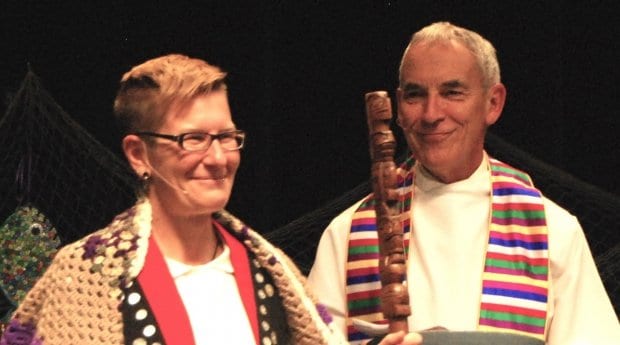The United Church of Canada approved a historic apology to LGBT people and elected its first openly lesbian moderator at its triennial general council in Corner Brook, Newfoundland on Aug 14, 2015.
Jordan Cantwell, a minister at Delisle-Vanscoy United Church in Delisle, Saskatchewan, succeeds Gary Paterson, who was the church’s first-ever openly gay moderator and who just completed his three-year term.
Cantwell was one of four openly gay or lesbian candidates among 12 hopefuls running for the position.
“This just bears further witness to other churches and wider society that there are other Christians who do not get bent out of shape about questions of gender identity and sexuality,” she says, “and that the Christian voice on these issues is not singular and there is room within the Christian faith for a diversity of perspective, beliefs and ways of engaging.”
Cantwell says her election helps dispel the stereotype, both within Christianity and broader society, that being Christian means being anti-gay. “That’s just not true,” she says.
In 1988 the United Church granted full church membership, including ordination, to openly gay and lesbian parishioners.
“Thirty years ago this was a big issue in the church but the United Church has done a lot of work and people have grown into a new understanding of human sexuality, so it’s no longer front and centre in peoples’ minds,” Cantwell says. “It’s just a part of who people are and we recognize the diversity of sexuality and gender identity and take it as a given.”
Cantwell says the election of an openly gay or lesbian person to the position of moderator bears witness to the church’s pro-gay policies. But, she says, LGBT acceptance is still not universal within the denomination.
“There are some congregations that would not call an openly gay or lesbian minister and for others it’s a complete non-issue,” she says. “We still live with that tension and diversity in our denomination.”
Despite the United Church’s progress on LGBT equality, she notes, it has yet to issue a formal apology to the community for past policies and positions that were harmful to LGBT people.
“The church has changed its attitudes and policies and it no longer believes what it believed about LGBT folks,” she says, “but what it hasn’t done is formally and officially apologize to the LGBTQ community for past policies and past positions for the hurt that was experienced.”
The United Church decided that a formal apology to the LGBT community would be premature and opted instead for a “living apology,” which it describes as a three-year process of dialogue, storytelling, education and reconciliation with LGBTT2Q people that will take the form of a travelling interactive art installation.
“One of the proposals passed at this general council is that we enter into a process of acknowledgement, repentance of, and apology to LGBTQ people for the history of exclusion and the hurt that does exist,” she says. “What shape that’s going to take or how it’s going to unfold — I don’t know what that’s going to look like but it’s not a one-time statement of ‘we’re sorry,’ but something that will touch hearts and minds as a lived and living policies.”
A final report of the process will be presented at the next general council in 2018 to acknowledge the 30th anniversary of the United Church’s 1988 decision to extend full church membership to gay and lesbian people.
“In some ways you can’t change or fix the hurt that was done, and heartfelt and sincere words are just not enough,” Cantwell says. “Sorry is the beginning not the end of apology and living into right relationship. I hope we have the courage to imagine our church in new ways outside the four walls of the building and out in the community and being witness to God’s love in the world.”

 Why you can trust Xtra
Why you can trust Xtra


